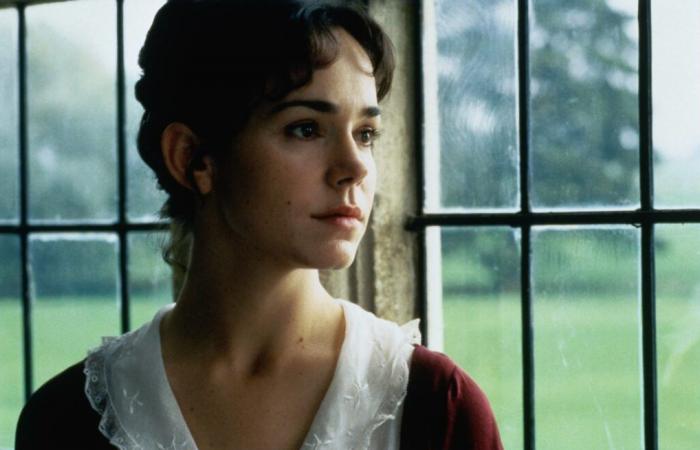The series A posteriori le cinéma is intended to be an opportunity to celebrate the 7the art by revisiting flagship titles that celebrate important anniversaries.
At the age of 10, Fanny Price leaves her family, who live in poverty, to live with Sir Thomas, her rich uncle. There, the brilliant young girl is treated as inferior. The years pass… At 18, Fanny and her beautiful spirit cope more and more poorly with an environment that is certainly opulent, but stale. Thus, as she begins to admit her feelings towards her cousin Edmund, Fanny realizes that Sir Thomas' fortune comes from slavery. However, when her uncle tries to force her into a marriage she does not want, Fanny measures the limits of her own freedom. 25 years ago this month, Canadian Patricia Rozema unveiled her film Mansfield Park (Lettres de Mansfield Park), a brilliant and daring metafictional adaptation of Jane Austen's famous novel.
You should know that from the mid-1990s, Jane Austen became very popular again thanks to the consecutive successes of the series Pride and Prejudice (Pride and prejudice), by Simon Langton, from the TV movie Persuasionby Roger Mitchell, and the film Sense and Sensibility (Reason and feelings), d'Ang Lee.
Basically, Patricia Rozema (I’ve Heard the Mermaids Singing / The song of the sirens) appreciated Jane Austen, seeing in her a sometimes misunderstood, or “misunderstood” author.
At the end of a screening of Mansfield Park at the Museum of the Moving Image, in 1999, the filmmaker explains: “Jane Austen worked in this genre [sentimental]but she was very unsentimental, and that's what I like. I think it's a crime to portray her as some sort of cutesy, romantic, soap opera-like person, as is often done. She had a sharp, even harsh, mind and quite incredible natural gifts for language. »
However, Patricia Rozema was not very excited when she was offered to adapt Mansfield ParkJane Austen's third novel, published in 1814 (and which the public snatched up when it was published despite the press' refusal to talk about it). In fact, Rozema found heroin, for once, uninteresting.
“What we remember about her is that she is rather quivering and shy,” summarized the filmmaker to the Nitrate Online site during the release. And she doesn't talk much. But the novel had so many other interesting elements. It is very different from the rest of Austen's work: it is crossed by darker currents, like slavery, without forgetting all this atmosphere of sexuality in Mansfield Park. The authorities are not necessarily benevolent, and the presentation of poverty is much more extreme than usual. In other novels, it's usually a small, passing scene, but here Fanny is plunged into abject poverty. I think Austen herself was very afraid of poverty. »
Meditation on captivity
These “darker currents”, which distinguished Mansfield Park in Austen's work, motivated Rozema to make the film. But rather than accept the protagonist as originally written, the writer-director decided to infuse her with a different personality: that of Jane Austen herself.
Still at Nitrate Online, Rozema confides: “I didn't understand why Jane Austen had written such a boring character, she who was capable of imagining heroines so captivating, fascinating, and expressing themselves so clearly. I read some biographies and found this almost anarchic spirit when she was writing her early works, and I thought it would be interesting to create this metafictional mix. »
How ? By using, to (re)construct the character of Fanny Price, Jane Austen's diaries and letters (letters that the actress Frances O'Connor reads to the camera in a break of the fourth wall, a process taken up by Carrie Cracknell in its 2022 adaptation of Persuasion). Above all, Rozema made Fanny an aspiring author, thus consummating the rapprochement with Austen.
Apart from the fact that she opted for this openly revisionist approach, but paradoxically faithful since it refers to Jane Austen herself, Patricia Rozema decided to frankly address the question of slavery, mentioned in the novel, but never explored in depth.
Moreover, for the American release of the film, the filmmaker was asked to cut a scene of her own: the one where Fanny finds sketches showing the abuse inflicted by Sir Thomas on slaves. Rozema flatly refused, despite the threat that her film would not obtain the desired “13 and over” classification.
“That scene is the reason I made this film — or, at least, one of my reasons,” she told ReelViews at the time.
Ultimately, only one of the sketches, showing nudity, was removed, but only in the American edit.
That being said, by making Fanny move towards abolitionist thinking, a development absent from the novel, Rozema found herself, here again, and despite appearances, to be in phase with Austen. As the filmmaker remarks during the discussion at the Museum of the Moving Image: “Was Jane Austen an abolitionist? She wrote in one of her letters: “I fell in love with the writings of Thomas Clarkson,” and Thomas Clarkson was an abolitionist. He only wrote on that subject. SO… “
Further on, the filmmaker continues: “And there is the title – I maintain that the title Mansfield Park is a clue to Jane Austen's intentions. The Mansfield decision was a very well-known judgment at the time. It was the first judgment limiting slavery in England, and everyone knew what the Mansfield decision was. This was the first advance of the abolitionists. And Austen did not title her novels lightly. This book is, and this film is, a meditation on captivity in all its forms, and on the treatment of human beings as property. »
Break the mold
When Mansfield Park took the poster, the critical reception was positive, despite notable hiccups. In The GuardianPeter Bradshaw mocked an “experimental” and “absurd” film.
Conversely, in the Chicago Sun-TimesRoger Ebert gave the film a perfect score, noting: “All of Austen's novels, in one way or another, are about young women who are gifted, but trapped in a stratum of society that forces them to sitting in living rooms where they are asked to be beautiful and quiet and where they are reduced to speculating about their marital prospects. By crossing this theme with the idea that Fanny is a writer, Rozema gets straight to the point. We assume that women have always written, but in reality, until 200 years ago, women authors were rare; Austen found her calling in the profession. Most women did not have the education, freedom, or privacy required to write. Virginia Woolf is eloquent on this subject in A Room of One’s Own [Une chambre à soi]speculating that a person like Austen may never have been alone in a room to write…”
Ebert adds: “The Fanny [du film] might grow up to write one day, well, Pride and Prejudice. We are so accustomed to Austen's intelligence and quick wit that we lose sight of the fact that the fact that she wrote constituted, in itself, a radical break with the role that society had assigned to her. »
Knowing this, one could argue that by breaking the mold of traditional adaptations, Patricia Rozema paid Jane Austen the most beautiful homage there is.
The movie Mansfield Park is available on Netflix, on Prime Video and on VOD on iTunes.






